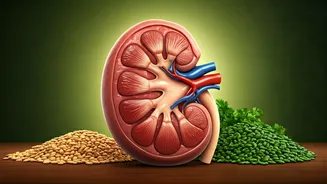Embrace Heart-Healthy Diet
The initial step towards maintaining arterial health involves adopting a heart-healthy diet. This approach emphasizes incorporating various nutrient-rich
foods while minimizing those known to contribute to plaque formation. Focus on consuming plenty of fruits and vegetables, providing essential vitamins, minerals, and antioxidants that may safeguard against oxidative stress. Consider adding whole grains to the daily intake as they offer fiber, aiding in cholesterol management. Another recommendation is to include lean proteins, such as fish and poultry, providing necessary amino acids while limiting saturated fats. In addition, replace unhealthy fats with unsaturated ones found in foods like avocados, nuts, and olive oil. It's critical to reduce intake of saturated and trans fats, as they contribute significantly to plaque buildup. Avoid processed foods, sugary drinks, and excessive sodium intake, which can adversely affect arterial health.
Incorporate Regular Exercise
Regular physical activity is a cornerstone in arterial health maintenance. Exercise helps improve cardiovascular function, assisting the body in effectively clearing plaque deposits. Engage in at least 150 minutes of moderate-intensity exercise or 75 minutes of vigorous-intensity exercise per week. Activities such as brisk walking, jogging, swimming, or cycling can significantly enhance cardiovascular health. Exercise helps reduce LDL (bad) cholesterol levels and increase HDL (good) cholesterol levels, which is crucial for arterial health. Furthermore, regular physical activity helps manage blood pressure and blood sugar levels, key factors influencing plaque development. Even short bursts of activity throughout the day can contribute positively. Consider incorporating exercise into the daily routine, aiming for consistency for sustained cardiovascular benefits.
Manage Stress Effectively
Stress can detrimentally affect arterial health. Chronic stress leads to increased blood pressure and inflammation, contributing to plaque formation in arteries. Employing effective stress management techniques is essential for cardiovascular well-being. Practices such as meditation, deep breathing exercises, and yoga can help reduce stress levels. Mindfulness practices can increase awareness of stress triggers and provide tools to manage responses. Spending time in nature and engaging in relaxing hobbies can alleviate stress, contributing to overall health. It is vital to prioritize sufficient sleep, as sleep deprivation can amplify stress levels and negatively impact arterial health. Developing a support system through social connections and seeking professional help when needed are also valuable strategies. Prioritizing stress management is a vital, often overlooked, aspect of arterial health.
Quit Smoking Immediately
Smoking is a significant risk factor for arterial plaque buildup and overall cardiovascular disease. Smoking damages blood vessels, making them more susceptible to plaque formation. Nicotine constricts blood vessels, increasing blood pressure and reducing blood flow, further exacerbating the problem. The chemicals in cigarette smoke damage the lining of arteries, fostering the accumulation of plaque. Quitting smoking is one of the most impactful steps one can take to improve arterial health. Support systems like counseling, nicotine replacement therapy, or prescription medications can help individuals quit smoking. The benefits of quitting are apparent relatively quickly, with improved blood flow and reduced risk of heart disease. Within a year of quitting, the risk of heart disease is dramatically reduced. Quitting smoking is a significant investment in long-term cardiovascular health.
Consider Natural Supplements
Certain natural supplements may support arterial health by promoting healthy blood flow and reducing plaque buildup. Before taking any supplements, consulting with a healthcare professional is crucial to determine the right choices. Omega-3 fatty acids, commonly found in fish oil, possess anti-inflammatory properties and can aid in lowering triglyceride levels, thus reducing plaque formation. Garlic has been shown to improve blood vessel function and reduce plaque buildup. Coenzyme Q10 (CoQ10) is another supplement that plays a crucial role in cellular energy production and has antioxidant properties, protecting against arterial damage. Niacin, a B vitamin, can improve cholesterol levels. However, supplements should be used in conjunction with lifestyle changes and not as a standalone solution. The key is to choose quality supplements and take them as directed under the guidance of a healthcare provider.

















